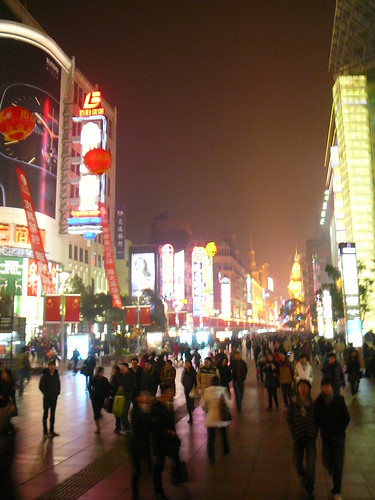
On the evening of my fourth and final day in Shanghai, I was sitting in a busy little hole-in-the-wall restaurant off Nanjing Street, working my way through a plate of mixed entrees—green beans, noodles, a forgettably flavored tofu, and equally non-descript meat—when a man began speaking at me from a nearby table. He was dressed in a zhongshan suit and cap; pinned to his chest were a number of red ribbons and a picture of Mao. He was middle aged and comfortably filled out his uniform.
“Good food here, yes?” he called out to me. The various other customers—all of us being closely packed together—glanced up upon hearing English. A few guys flashed grins at their girlfriends.
“Yeah, it’s good.”
“You like Chinese food?”
“Sure.”
“Do you like China?”
“Yes,” I answered a little more hesitantly, wondering how all this was tending, “I think it’s a very exciting place.”
“Exciting,” he rolled the word around in his mouth a moment, “Yes, exciting. I’m from Taiwan, you know.”
“Oh . . .so you prefer it here, I imagine.” The thought of his outfit going over well in Taipei didn’t seem likely.
“Yes, I moved here in 2000. Taiwan is in decline. China is on the rise. May I sit?” he indicated at the seat across from me.
“Sure,” I was curious to see where this went and, anyway, it seemed ridiculous to be shouting at each other across the room.
“You see Taiwan’s manufacturing base is disappearing. No one makes things there anymore. All the factories are moving to China.”
“I suppose I don’t see as many “Made in Taiwan” labels anymore . . .”
“No.”
“And what is your job?”
“I’m retired. But I was an importer-exporter. Now I teach Chinese to foreigners. Here’s my card.” He handed me a business card with a great deal of Chinese on it that I could make nothing of. The name on the card said “Nelson Mandela,” but this was crossed out and, written above it, was the name Nelson Chu.
“You know who Nelson Mandela is, yes?” he said, eyeing me.
“Sure.”
“He’s my hero. Do you like my card? Why do you come to China?”
“I’m going to teach English in Xian.”
“And why China?”
“It seems like a very interesting place. It has a unique culture . . .”
“Yes very ancient. Do you think China is overtaking America? Is America in decline?”
“People say America is declining, but I don’t know. Twenty years ago they said the same things about Japan. Japan was going to overtake America . . .well, that didn’t happen. I think China is developing, yes, but I don’t think it has to be a competition. There’s room for both . . .”
These thoughts clearly didn’t please him greatly—a dyspeptic shadow had fallen across his face. Yet, momentarily, he roused himself and resumed his odd good humor. As I casually hurried to finish my meal, he quizzed me about my education and whether I was interested in Marxism. I recommended that he read A People’s History of the United States and, my food finally finished, said my goodbyes.
Although this man was clearly unbalanced in some regards, his basic points were sound enough. In some form or another this idea of American decline had been bouncing around my head during the whole of my time in the city. Now, of course, I wouldn’t have phrased it that was at the time. In the moment, what I felt was a more generalized sense of unease and displacement. The difference between the China I had expected and that which I encountered was startling.
During my first few days, I had been to neighborhoods as nice as any I had encountered in Seattle or New York. Actually, nicer. I had wended my way down one major street that was lined with designer jewelry and fashion boutiques which gave way to mammoth shopping malls and hotels. Walking down this street were Chinese dressed in the most chic of clothes. (There were also large numbers of wealthy westerners here—mostly well-heeled-looking men, lock-armed with Chinese women.)
And undergirding all of this was a vast army of laborers. As I came to the end of this particular street (that is to say the point where any destinations accessible by foot fell away and were replaced by the sort of massive landmarks one only pulls up to in a car) I found myself alone, walking down an endless boulevard lined with trees, all lit up with white Christmas lights. The sky was now pitch black and this lifeless luminescence—lifeless because there was not a soul but me to appreciate it—was almost painfully beautiful. Standing, considering all this, I heard a clanking noise and turned my head upwards to see a man, perched in one of the trees, slowly curling lights around the branches. Here it was seven o’clock at night and this man was still toiling away, manufacturing the beauty.
Shanghai was a beautiful city, but it was a very particular sort of beauty and not one I cared for. Istanbul had been unbearably beautiful. Lining the Bosphorus were the most luxurious of houses and enclaves. All of these places had radiated a sense of wealth, but it had been a wealth in repose; the way one pictures the old plantation south. The money was there, but it was tied to a life of leisure and beauty, of fine architecture and the smell salt water.
Shanghai had the feeling of new money. The wealth was all there on display—you were always being bludgeoned by it. Every building eagerly screamed at you: This cost money! There was no subtlety and, surely, that was the point. Here was a city on the rise, on the make, eager to remind all of what it had become. This was highly effective. I was never unconscious of how robust an act of creation the city was and how pale and anemic the world I came from was in comparison. Civilization in Shanghai had the sense of passing through an heroic age where great things were possible whereas America had passed such a point. It was impossible to conceive of American cities every again experiencing the degree of change Shanghai was undergoing. The America I knew no longer had the will for such concerted displays of greatness.
But—and this is the crucial point—I would not want to live in Shanghai. The city was a wasteland. All the beauty was artificial. The closest one could come to nature was a walk along the banks of the Huangpu River. Here one could sit on benches and view the city skyline, but even from this vantage the only beauty was that of constructed things.
And away from the city center things were worse. My hostel’s neighborhood, on account of its numerous markets and small restaurants, had a more down-to-earth vibe that appealed to me, but it was also an endless sprawl of gray building and omnipresent dust. The most pleasant discovery I had while there was to wander into Lu Xun Park on Sunday and find the whole place alive with activity. In one section there was martial arts practice, in another yoga, in another salsa dancing, patriotic singing, kite flying and ballroom swing dance. Most of the crowd was older and all seemed to be thoroughly enjoying this time out and about. Yet the whole park was drab and dusty. The waterways were brown and stagnant. The only thing that redeemed it all was the humanity and the high spirits of all involved.
On my last day in the city, heading to the train station, I got off the subway a stop too early and found myself in a part of the city that looked as though it had been dreamed up by Cormac MacCarthy. All was brown and hazy with dust. No green was to be glimpsed and the various storefronts all seemed to be in the process of decay. The train out of the city revealed endless swaths of ugly apartment blocks, often pressed up again shanty-houses.
That it was no worse than what I had seen in other cities was a fact which I tried to keep at the forefront of my mind. I might have seen better vistas than Shanghai had to offer, but many residents of this city doubtlessly had not. What I viewed as depressing could easily be given a different construction: What people living in China at this particular historical moment were witnessing was a vast act of self-creation. The city was surging to life in every direction one looked. It was the speed and the scale that were amazing—not necessarily the aesthetics. To be a Chinese at this moment was to see a profound change underway of which all the dust and gray and the ugliness was a symbol. To them it might well be reason for soul swelling optimism. Someone like myself coming from a cushy background, where the dirtiness of progress had been long ago swept under the rug, perhaps lacked the requisite perspective.
It was this sense that divided my mind much of the time I was in Shanghai: Distaste for what I was personally experiencing balanced by a deep awe in the face of it all. As I made one last pass up and down Nanjing Street, beneath blaring neon signs, through surging crowds and past touts who, somewhere around ten at night, switched from hissing “watches and bags” to “girls,” I tried to ditch my qualms. It was easy to do. In the face of such vitality, such light and energy, how could one think about the downside of things. Walking down the street, the world felt young and all seemed possible.












Tidak ada komentar:
Posting Komentar